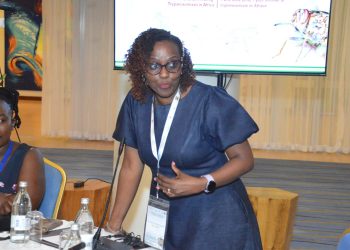By Ngumbo Njoroge
Adequate financing of good laboratory practices, an essential to evidence-based medicine, will determine the pace and extent to which Universal Health Coverage will be achieved in the country.
Dr Ahmed Kalebi, Group Managing Director and Consultant Pathologist at Lancet Group of Laboratories emphasized the role of laboratory investigation in all healthcare decisions affecting diagnosis and treatment.
“Without quality laboratory testing there can be no adequate healthcare, thus an efficient laboratory services is key to achieving UHC,” Dr Kalebi told researchers at the 9th Annual KEMRI Health and Scientific Conference.
It is estimated that 70 percent of all health care decisions affecting diagnosis and treatment involve laboratory investigation, including preventive, promotional and curative health.
However, Dr. Kalebi said due to misconception of its role, lab services receives little allocation at the national and county levels
“In most cases laboratory services receive less than 10 percent of the healthcare budget despite often being ‘milked’ as ‘cash cows’ to generate funds for healthcare providers.”
The pathologist said provision of affordable, equitable and accessible healthcare for all should include laboratory and diagnostic testing to reduce delays in diagnosis and treatment.
Inadequacy in provision of these services also results in treatment for wrong ailments and drugs underuse, overuse, and abuse.
Financing of laboratory services must factor both capital and operation expenditure, Kalebi said.
“In setting up and running laboratory services, most healthcare providers often focus on capital expenditure at the outset without paying attention to efficient structuring of operational expenditure.”
He said scaling up quality laboratory services to meet the requirements of UHC would require a focus on ramping up financing of capital and operational expenditure by government and private sector.
Kalebi urged policymakers to explore and maximise on collaborative partnerships in financing laboratory services.
“Commonly utilised consumer-based funding mechanism needs to be juggled against constrained cash flow, while leveraging on other financing options such as donor funding and collaborative partnerships.”
Funding, he said, efforts must focus on the total testing process.
The laboratory test pathway includes test selection, test ordering, patient specimen identification, transportation, specimen processing, analysis, review and interpretation.
According to the African Society for Laboratory Medicine (ASLM), high-quality laboratory services are largely dependent on appropriately trained and qualified personnel, yet laboratory professionals continue to figure prominently among neglected health cadres across sub-Saharan Africa.
“There are often insufficient numbers, a skewed distribution, low level of qualifications, and limited career opportunities. Personnel often work in poorly equipped facilities, and do not systematically respect safety standards.”
The 2008 Maputo Declaration on Strengthening of Laboratory Systems and the 2012 African Society for Laboratory Medicine Ministerial Call for Action drew attention to the importance of laboratory services.
The Ministerial meeting emphasized the role of laboratories in dealing with all diseases, in ensuring quality clinical care towards universal health coverage while adding that the role is relatively marginalised.
ASLM identified barriers in affordability resulting in high out-of-pocket payment as a key obstacle to meeting UHC targets.
Kalebi said there is need for discussion on the use of public or private laboratories to achieve UHC, keeping in mind that private providers may be able to provide services that public providers cannot.














